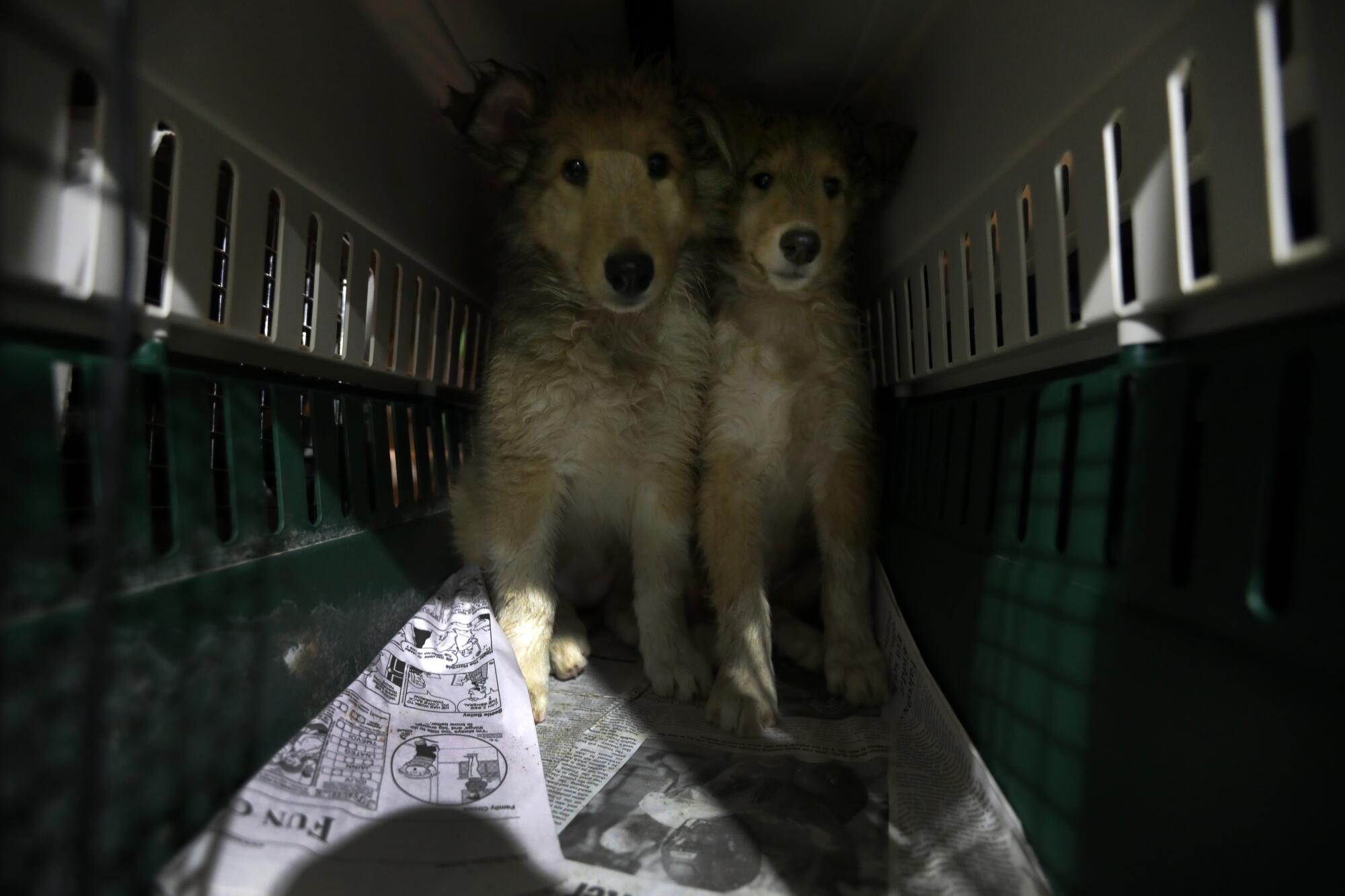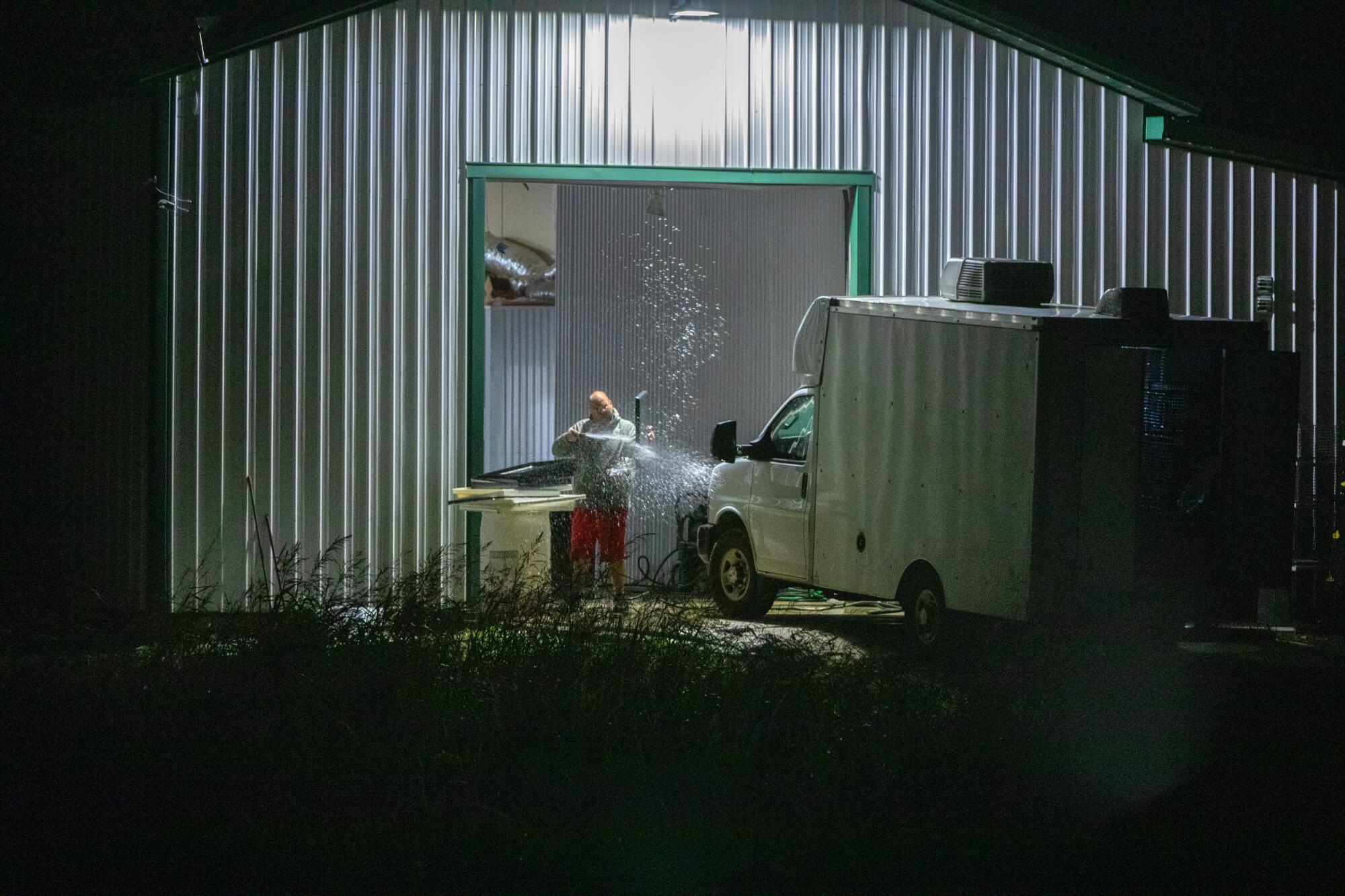
California requires that dogs be examined by a veterinarian before they can enter the state for sale, a law meant to protect consumers from buying sick puppies and track disease outbreaks.
But the state purges thousands of the veterinary forms as they pour in from around the country, without even looking at them.
State officials have an easy answer for why they destroy the records: They shouldn’t be receiving them. California requires that they be sent to the counties the dogs are bound for.
County officials, though, seem unaware they are supposed to collect them and, for the most part, don’t.
The fallout is that some California consumers unknowingly buy high-priced pets from unscrupulous middlemen who import and resell the puppies with little oversight — at times from profit-driven mass breeders across the country, a Times investigation found.
The bureaucratic mess has angered animal advocates.
“To say I’m surprised and alarmed would be an understatement of epic proportions,” said Gary Weitzman, head of the San Diego Humane Society. “At the very least, they have to start with not destroying evidence.”
Under California’s convoluted law, individuals who bring in dogs are obligated to send the records to county public health departments, but few actually do.
Most states in the country receive the travel forms for dogs coming and going. These certificates of veterinary inspection are handled in many instances by state agriculture departments, which have provided copies to the California Department of Food and Agriculture for years.
Officials with the California agency said they don’t forward the records to counties before they scrap them.
Most of the state’s 58 county public health departments said they didn’t have the records. Orange County was adamant that the state was supposed to be in charge of them. Ventura County provided only one travel certificate, and said if there were more, officials wouldn’t know about it because importers weren’t following the law.
Only San Diego County appears to regularly receive travel certificates, nearly all of which were for two private shelters that have imported 6,550 dogs since 2018 from other states, according to the county.

Eight other counties provided 162 travel certificates for the last six years. The Times, though, requested the records from other states and obtained tens of thousands of them for dogs coming into California.
In a statement, the state’s agriculture department stood by its decision to destroy the records: “The sale and movement of household pets are outside of CDFA’s jurisdiction. ... We have messaging on our website that provides the correct destination for certificates of veterinary inspection.”
That messaging is a general statement that the forms should go to local public health departments where the dog will live or be sold.
State officials acknowledged creating an email address specifically to filter the records they receive — and more easily delete them — due to the high volume.
The agency said that senders get an auto-reply indicating that it doesn’t regulate dogs coming into the state and that importers should send the travel certificates to counties. Reporters sent emails to the address and did not receive that response until recently.
Hard copies of the travel records that arrive from other states are destroyed without notification to the sender, agency officials said.
In a 2020 email exchange reviewed by The Times, Wisconsin officials were advised that travel certificates should be sent to counties. When they asked for the right contact information, California officials said they didn’t have it.
Since travel certificates are supposed to detail who is bringing dogs into the state, they can be a resource in proving crimes, such as tax evasion, and revealing organizations claiming to be rescues that buy designer dogs from breeders.
“Policymakers and the public rely on information like this to inform the scale of problems and to tailor solutions,” said Jennifer Fearing, a longtime animal advocate in California.
Years ago, before new regulations were put in place, the food and agriculture agency routinely kept the documents sent from other states, Fearing said. While working as a lobbyist on behalf of the Humane Society of the United States, she said she was able to obtain records in 2010 that detailed how California was driving demand from Missouri puppy mills.
Fearing said at the time the state’s agriculture department had shipped the physical records to another state agency, where she found them in stacks of cardboard boxes.
“CDFA went from disinterested to destructive,” she said after learning the records are now deleted.
Lee Benson, a spokesman for the Oklahoma Department of Agriculture, Food and Forestry, said travel certificates are critical in investigating the source of a disease outbreak.
“It ensures there’s not a situation where it’s like, ‘Oh, no, where did this animal go?’” Benson said.
He said Oklahoma no longer sends copies of the records to California at CDFA’s request.
Apathy by California officials and confusion among counties over the records has enabled bad actors to buy dogs from out-of-state puppy mills and advertise them as locally bred, The Times found.
Reporters requested health certificates from all 50 states and analyzed the movement of nearly 88,000 dogs traveling into California since 2018.
California only requires travel certificates when a dog is sold or changes ownership. It doesn’t require them for cats. Some of the documents The Times obtained were for people traveling with their pets or moving. Many, however, involve the sale of 8-to-12-week-old puppies.
Hundreds of records showed dogs going to destinations in California that do not exist and to people using various aliases.

The records reviewed by The Times, however, did not give a full picture of the number of dogs coming into California.
Connecticut said it discovered a person handling the records had mistakenly believed that they could be destroyed after 30 days.
“We have corrected this and will be keeping them 2 years as required by our record keeping rules,” said Carole Briggs, staff attorney at the Connecticut Department of Agriculture, in a written response.
Clint Quarles, an attorney with the Kentucky Department of Agriculture, said his state could provide only a random assortment of health certificates that staffers had not yet purged.
Those records show at least 736 dogs approved for transport to California since 2018.
“There could be tons and tons and tons of CVIs out there that are animals of Kentucky origin going to California, but we’re just totally unaware of it,” he said.
Indiana, which keeps the records sealed from the public but shares them with other state governments, said it sent more than 14,000 travel documents to the CDFA of dogs being brought into California since 2018. Those records would have been accessible under California’s public records law, had they not been deleted.
Without the records, animal welfare groups say there are fewer opportunities to identify where dogs come from and where they end up. That’s become especially important in recent years as states, including California, have restricted or banned dog sales at pet stores.
“That’s sort of a back-end way — or one of the only ways — that we can make those linkages,” said Jennie Lintz, senior director of the Puppy Mill Initiative at the American Society for the Prevention of Cruelty to Animals.
More to Read
Sign up for Essential California
The most important California stories and recommendations in your inbox every morning.
You may occasionally receive promotional content from the Los Angeles Times.










